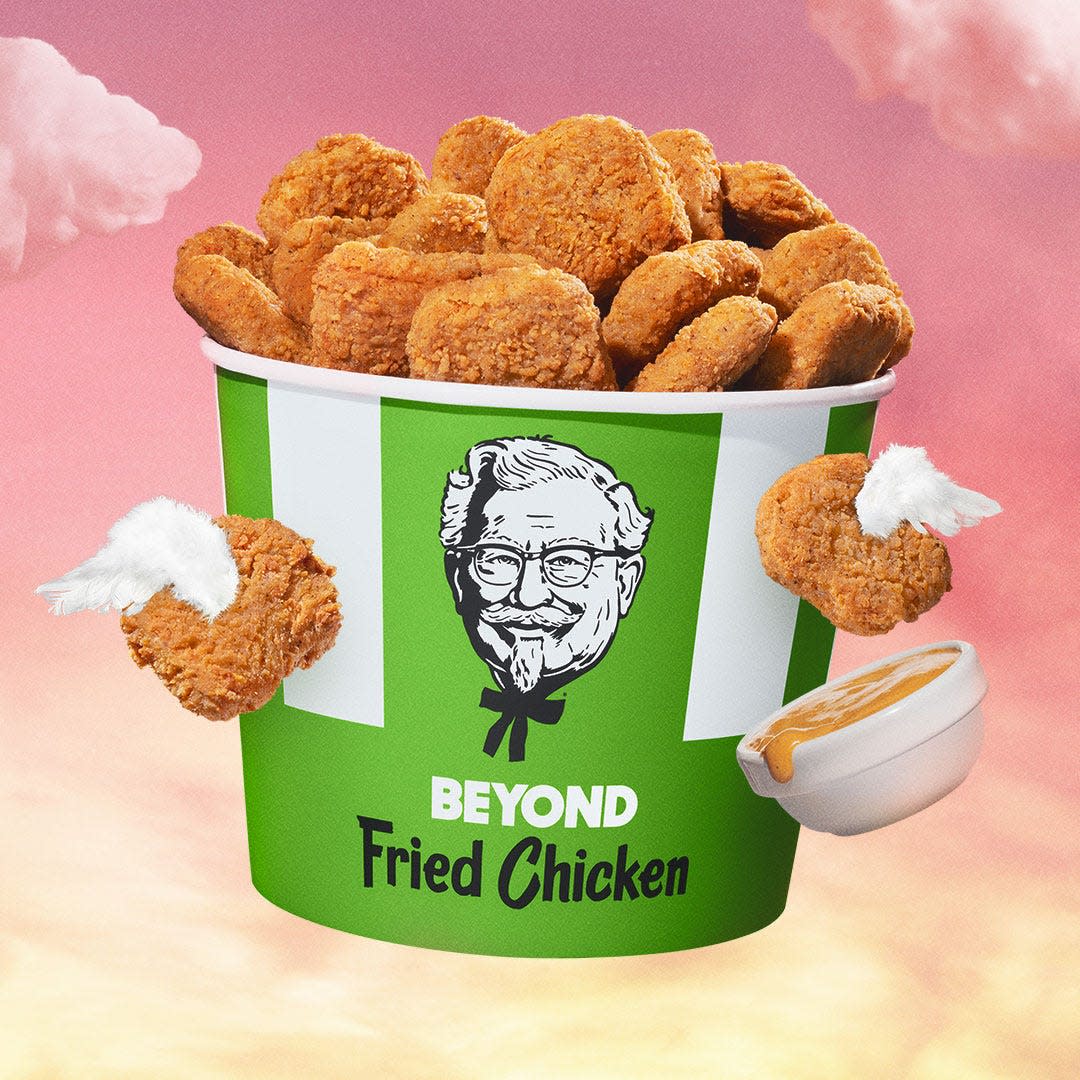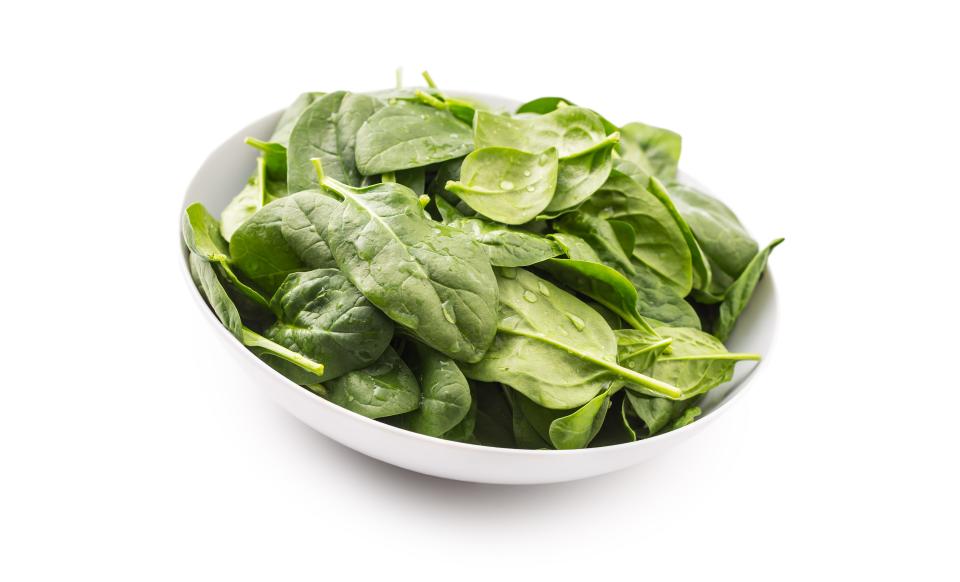Plant-based meat alternatives, like new nuggets from KFC, sound healthier. But are they?

When "Beyond Fried Chicken" was added to Louisville-based Kentucky Fried Chicken's menu on Jan. 10, it became instantly clear that plant-based meat alternatives had gone mainstream.
“We couldn’t be prouder to partner with KFC to offer a best-in-class product that not only delivers the delicious experience consumers expect from this iconic chain but also provides the added benefits of plant-based meat,” said Ethan Brown, founder and CEO of Beyond Meat.
Made with pea protein and flavored with KFC’s signature “finger-lickin' good” seasonings, the Beyond Fried Chicken menu item is the most recent addition to "on-the-go" faux meat offerings such as The Impossible Whopper at Burger King, Chipotle's plant-based chorizo, Impossible Breakfast Sandwich at Starbucks and Taco Bell’s Veggie Power Menu Bowl and the Black Bean Crunchwrap Supreme.
You may like: Here's how the pandemic forever changed the way we exercise (for the better)
Not to be outdone, other fast-food giants promising faux meat items in the future include McDonald's (McPlant Burger,) Panda Express (Orange Chicken) and Little Caesars Pizza (meatless pepperoni pizza.)
And while plant-based fast food sounds like a healthy alternative to big beefy burgers and crispy fried chicken, before you rush full speed to the drive-thru, Jennifer Kyser, a registered dietitian at Norton Healthcare Weight Management Center, suggests you pump the brakes.
"I think you need to have a good understanding of why you choose to eat these plant-based products. Many people don't consume animal products for ethical, environmental and health reasons," Kyser told The Courier Journal. "But if you are eating meatless products as a substitute for whole foods, like salad, a sweet potato or a banana, be aware that some plant-based products are highly processed and higher than you might think in calories and sodium. In that regard, it's a mistake to assume plant-based is healthier than whole foods or animal products."
Good-quality meat is a source of protein that your body needs to sustain muscle and provides your body with many different vitamins, minerals and nutrients. Plant-based diets also have their own unique set of health benefits from vitamins, minerals and proteins, which include a lower risk of cardiovascular disease, stroke, high blood pressure, obesity and more.
"If you are looking to cut back your meat consumption, plant-based alternatives can help ease the transition," said Kyser. "But just because a product is vegetarian or vegan doesn’t necessarily mean you should assume it's a healthy food that belongs on your plate every day."
So what does that mean for this latest plant-based food trend? And what should you look for as a consumer?
Why you shouldn't assume plant-based products are healthier
When looking for a vegetarian or vegan meat alternative, it's a good idea to understand what you are putting into your body. Just because something is plant-based does not mean it's healthier, Kyser cautioned.
Salt is often used to improve flavor and increase the shelf life of many commercial food products. That means you should keep an eye on the amount of sodium, saturated fats and preservatives when consuming meat alternatives. Also, plant-based options typically contain less protein than animal products.
What about the calories? If you watching your weight, don't assume the plant-based product will give you a sustainably lower calorie count. A quick check of the Burger King website shows the Whopper (beef) with all the fixings has 677 calories while the "fully dressed" Impossible Whopper (plant-based) is 626 calories — a difference of around 50 calories.
That plant-based chorizo at Chipotle comes in at 220 calories per serving, the highest calorie count on its fillings menu. Six of the Beyond Chicken nuggets at KFC clock in at 480 calories while a large order of traditional popcorn nuggets is 620 calories. An order of 12 Beyond Chicken nuggets has 960 calories.
You may like: The origin of vanilla: Everything you want to know about the world's sweetest spice
So while those aren't bad options, they may not be as health-conscious as consumers may think. For vegetarians or vegans like Erica Steitz, these new fast-food offerings are convenient options that can make life easier when you are in a rush or on the road.
"As a person who doesn't eat animal products, having these fast food options on the road during family trips is really convenient," said Steitz. "I usually need to pack all my own food when we go on a road trip because there used to not be anything I could order at fast-food restaurants."
But Kyser cautioned that consumers should realize most of these restaurants share equipment (like fryers) with non-vegan items.
Why you should always read nutrition labels, even on 'healthy' products
The internet is one of your best tools if you are interested in learning just how manufacturers make these popular plant-based products.
Impossible Products use a variety of ingredients to make burger, sausage and pork alternatives. There’s soy and potato for protein, heme and yeast extract for flavor, coconut and sunflower oils for fat as well as methylcellulose and food starch for binders.
Beyond Meat makes plant-based meat alternatives for meatballs, sausages, burgers and more. Protein comes from beans, peas and brown rice while cocoa butter, coconut oil and expeller-presses canola oil offer fat. Beet juice, apple extract and natural flavors make the products look like real meat. Calcium, iron, potassium chloride and salt provide flavor while carbohydrates like potato starch and methylcellulose offer structure.
"If you are an occasional fast food customer, plant-based options are fine, it's just important to understand they're not going to be as healthy as whole foods," Kyser said, adding that plant-based fast food can help fill the void, whether you’ve recently cut out meat from your diet or are just trying to eat less of it, which is not a bad thing.
The assumption that "plant-based" or "low-fat" means healthier is not a new trend.
You may like: The worst pandemic facing America right now isn't COVID-19. It's obesity. Why that matters
Thirty years ago, Snackwell's low-fat cookie craze gripped the nation. If you are too young to remember, sorry about your luck, it was a glorious, yet brief period for cookie lovers. Stores couldn't keep the sweet treat on the shelves as consumers gobbled down what many assumed a healthy alternative to the run-of-the-mill cookie because Snackwell's was low in fat.
It took a couple of years of reckless consumption before cookie-crumb-covered Snackwell's lovers thought to turn the package over and read the nutrition label on the back. In what sounded like a nationwide gasp, devotes of the snack discovered that what the cookie lacked in fat it more than made up for in sugar.
As they say, "that's the way the cookie crumbs."
In consumers' defense, nutrition labeling only become mandatory in 1990, so many people were not in the habit of reading the information 30 years ago. Today, with nutritional information readily available on the internet, it's easier than ever for people to look up the ingredients of various products.
Kyser said at the end of the day, consumers should remember that plant-based products are fine to consume but shouldn't become a permanent replacement for nutrient-dense whole-food plant protein sources such as beans, lentils, nuts, seeds and whole soy.
Why you should add these plant proteins to your diet

If you're looking to eat more plant-based meals, consider swapping out the meat in a recipe for these options:
Beans and lentils: Beans are a great source of fiber and nutrients. Toss them on top of a salad, or use them in soups and stir-fries. You could also make your own bean-based veggie burger at home.
Tofu: It’s made from the whole soybean (rather than an extract) and is considered a complete protein. Try choosing one that’s non-GMO or organic and tossing it into a stir fry, or crisping it in the oven.
You may like: More than 1/3 of Americans are obese. Here's why many of us can't break bad eating habits
Tempeh: Think mushy tofu tastes like Playdough? If you don't like the texture of tofu why not give tempeh a try? It’s also made from whole soybeans but has the added benefit of being fermented, which may help with digestion and absorption of nutrients. It’s also generally higher in protein than tofu and provides ample amounts of calcium, iron, and manganese.
Vegetables: Vegetables like artichokes, asparagus, broccoli, Brussels sprouts, collards, peppers, potatoes, spinach and sweet potatoes are all good sources of protein, according to the American Heart Association.
Reach Kirby Adams at kadams@courier-journal.com or Twitter @kirbylouisville.
This article originally appeared on Louisville Courier Journal: Plant-based food from KFC, McDonalds, Burger King may not be healthy

